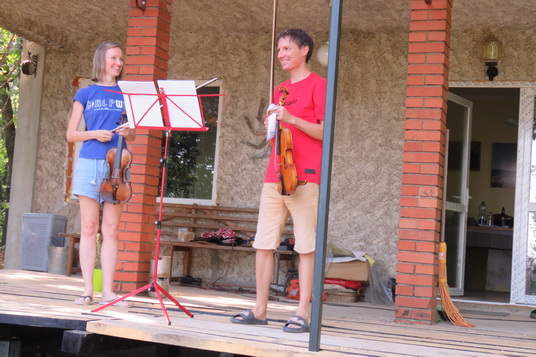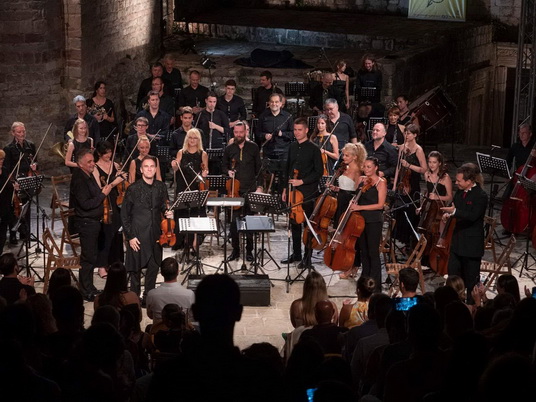Andrey Timofeev, a violinist, is residing temporarily in Belgrade for months now. He arrived from Vienna after leaving Russia for starting its invasion on Ukraine. He is decisively against war - stating that he "would rather end up in jail then shoot another human being". After the beginning of the Russian “special military operation" he got fired from the Symphony Orchestra of Capella in St. Petersburg.
In an interview for the SEEcult.org, Timofeev speaks about his experience of staying in Serbia, where he is hosted by The Small Art Center of Zemun - ZMUC, and engaged in an international network Artists at Risk that helps artists in exile.

Andrej Timofejev, ZMUC, Beograd, 2022.
- Could you tell a short history of your exile? When did you leave Russia and why? Why and when have you been fired from the Orchestra? Did you have previous plans to further your career in Europe or the war in Ukraine was a turning point? How?
Andrey Timofeev: During my career I many times thought about living, studying, working in Europe, because art is international. But the beginning of the war was a last point, when I understood that to continue to live in Russia is impossible. And of course the dismissal from the job helped me to make a decision. It was in March.
- What was your career like in Russia? Did your family understand the reason behind your departure?
Andrey Timofeev: I worked in one of the best orchestras of St.Petersburg, it was an interesting job, and I liked it. I loved the city, as well.
Some members of my family understood me, some didn’t.
- How long did you stay in Austria and how did you get in touch with the Artist at Risk?
Andrey Timofeev: I stayed in Austria only for one week, my visa expired. I wrote letters to several foundations, and one of them, Resque Forum, recommended me the Artist at Risk.
- In what way did they help you? What were your experiences in collaboration with them? Have you been afraid because your Schengen visa was expiring?
Andrey Timofeev: They offered me to go to a country that didn’t demand visa. For example, they collaborated with Serbian organization ZMUC who gave me a place to live.
- A host in Serbia is found 24 hours before the visa expiry, have you had any idea on the next step minding your certain refusal to go back to Russia?
Andrey Timofeev: I always wanted to do all possible not to go back.

Andrey Timofeev, Yugoslav Film Archive, Belgrade, 2022.
- What was your first impression upon arrival to Serbia? You had to cross the border twice to get approved to stay aka Serbian residency, after 3 months. You were in Sarajevo first, and Cetinje the second time. Could you share some of your experiences from there?
Andrey Timofeev: I have visited Serbia before, 10 years ago - I have been to Belgrade and Novi Sad on a tour. But living here for half a year already, I got to know Serbia from within, I've met the people, they are very hospitable. I'm slowly learning the language, the culture and the history. My travels to Bosnia and Herzegovina, Montenegro and Bulgaria allowed me to get familiarized with the Balkans from different angles.
- You have been in Serbia since March 22nd, how was, in the meantime, your perspective changed regarding “dissident” status and the subsequent fall of events in Russia and Ukraine?
Andrey Timofeev: I wouldn't call myself a dissident, especially because I'm not in Russia right now. My relationship towards the events doesn't change, I am categorically against war and I'm embarrassed for what is going on.
- What do you think will be different if you remained in St. Petersburg?
Andrey Timofeev: I think everything would be different. If I stayed in Saint Petersburg, I'd have two options - to stay silent, to be afraid to express my opinion even to the closest of people, or to go to jail.
- How did you remain in contact with colleagues and friends from your home town? What is going on with them now?
Andrey Timofeev: I've stopped communicating with some of my acquaintances, but with others I'm still in contact.
Many have left to different parts of the world - to Europe, Asia, Latin America… many want to leave but they can't, because of many different reasons. Unfortunately, there are also the ones who support what is going on.

ZMUC, Babe, 2002.
- How did you get involved with the FB group “Rusi, Ukrajinci, Belorusi i Srbi zajedno protiv rata”, and what are the actions you have participated in?
Andrey Timofeev: I just saw this group on Facebook, then there were meetings offline, anti-war actions, gathering humanitarian help for the refugees from Ukraine..
- Are there any artists within the group, where and how do they live, is there any institution that helped them in Serbia?
Andrey Timofeev: Unfortunately among the people who arrived to Serbia there are artists and creators/makers, especially many IT professionals, because they can work from distance.
- In Serbia, you commenced playing in two orchestras, what are your experiences?
Andrey Timofeev: Yes, a big thank you to Tanja Petovar and Ivana Stefanovic, who sent my CV to a few orchestras, and with two of them I have collaborated. It's a nice feeling when you can do your job again after a longer period of time.
- You had numerous auditions, sometimes you have been accepted, and sometimes you had a job offer (Austria, Spain, Finland, Czech Republic and Bulgaria) - have you ever applied for an EU visa based on a job offer?
Andrey Timofeev: I wouldn't talk work possibilities until something actually happens. Yes there are a few suggestions and plans on which I am currently working on. As soon as something happens, I'll let you know : )

Orchestra Virtuosos with Stefan Milenkovic and Bojan Sudjic, City Theatre Festival, Budva, 2022.
- How do you see border closures for Russian citizens and artists among them?
Andrey Timofeev: Fortunately, so far only a small number of countries have closed their borders. But it is harder now to get a visa, more time and documentation is needed, and it's more expensive.
- You have legal residency status in Serbia. How difficult were the administrative and bureaucratic requirements regarding the registration a “business” in Serbia?
Andrey Timofeev: Yes it was rather complicated. Especially at the beginning of the whole process, when I didn't know absolutely what to do. Except for that, the rules are often changing.
- Could you describe, briefly, your experience with ZMUC – being an artist in residence in both Zemun and Babe?
Andrey Timofeev: I can only express the amazement and the gratitude towards Vesna Tasic and Goran Denic. We live in a beautiful apartment in Zemun and at a residence outside of the town. The hosts help us in terms of documents. During this time we've gained friends, we've associated with them and with their friends, we got to know Serbia and local traditions.
- What would be an ideal artist-in-residence space?
Andrey Timofeev: Nature, silence, pleasant people.
- Once you leave Serbia for good would you ever come back?
Andrey Timofeev: Yes, of course, with pleasure!
*Photo: ZMUC
(SEEcult.org)
*Funded by the Stabilisation Fund for Culture and Education 2022 of the German Federal Foreign Office and the Goethe Institut
